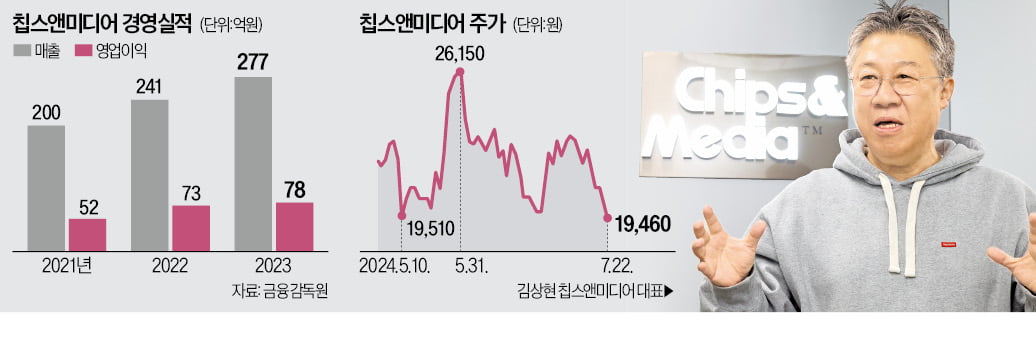News

News
Overseas Royalties on Video Codec IPs Alone Account for 10 Billion KRW of Chips&Media’s Annual Reven
Overseas Royalties on Video Codec IPs Alone Account for 10 Billion KRW of Chips&Media’s Annual Revenue
Seoul, South Korea- Jul 23, 2024
Video IP Tycoon, Chips&Media
Qualcomm and NXP as its Clients
Chips&Media’s IPs on 1.5 Billion Chips over 20 Years
IP Launch for AI Semiconductor NPUs
M&A with Companies Equipped with Leading-edge Technology
Video codecs are essential for video playback on electronic devices. They are embedded in semiconductor chips to record and reproduce video contents by converting the image information into a digital signal (encoding) and replaying (decoding) it to recreate the original image.

<Chips&Media’s Business Performance>
Chips&Media, a leading provider of video codec IPs, generates substantial surpluses through robust royalty sales. Its clients include major semiconductor manufacturers such as Qualcomm, NXP, and Texas Instruments. Royalties are the fees paid when chips incorporating licensed IPs are sold. However, IP companies often face a long wait between licensing their IPs and receiving royalty payments from chip sales. This delay is a key reason why small IP businesses are frequently sold before they can realize royalty revenue.
On July 22nd, Kim Sang-hyun, CEO of Chips&Media, stated, "Since our establishment in 2003, with over 20 years of experience, our sales structure has become robust." He added, "To date, more than 1.55 billion chips have incorporated our IPs. We are the only mid-sized company in Korea to generate over 10 billion KRW in royalties annually from overseas clients." Last year, Chips&Media's royalty revenue reached 10.8 billion KRW.
The IP industry does not deal with physical products, which poses significant barriers for new entrants. Because IPs are intangible, having a proven track record of adoption in semiconductor companies' past products is crucial. The CEO emphasized, "The fact that our IPs have been in use for over 20 years demonstrates their reliability and success."
Chips&Media is now targeting the neural processing unit (NPU) market as a key growth driver. An NPU is a semiconductor that mimics the human brain, where numerous neurons are connected to each other and exchange signals. It can process data quickly in real-time without a network connection, making it a crucial part of the artificial intelligence (AI) era.
Last September, the company developed the application-specific NPU IP, which enhances image quality. This IP features a super-resolution (SR) image processing algorithm that converts low-resolution videos to high-definition ones. "NPU IP is our company's next-generation business model. We are in active contact with domestic and foreign semiconductor chip manufacturers for license deals,” said the company's CEO. He further noted, “Our IP is 80% smaller than other companies. It means our IP is more efficient because it consumes less power.”
Strategic acquisitions are also being reviewed to rapidly enhance the company’s competitiveness in NPU IP. He said, "We are seeking companies with technologies we currently don’t hold. If a technically skilled company becomes available at an appropriate price, we are ready to proceed with the acquisition."
This year, Chips&Media plans to expand its market presence by forming a joint venture (JV) in China, driven by the Chinese government’s increasing investment in its domestic semiconductor industry. The CEO explained, “We are set to establish a JV with a local Chinese firm in the third quarter of this year to strengthen our presence in the region.”
The company is also actively recruiting high-end personnel to augment its technological edge. To support this goal, Chips&Media established a new R&D center in Dongdaegu Venture Valley, Sincheon-dong, Daegu, in March of this year. Located near Kyungpook National University, Daegu Gyeongbuk Institute of Science & Technology (DGIST), and UNIST (Ulsan National Institute of Science and Technology), the center is aimed at attracting top developers. "Our compensation is comparable to that of major tech companies, and we will continue to enhance our capabilities by expanding our recruitment of high-caliber professionals," he added.
- New post
- There is no new post.
- Old post
- There is no old post.
